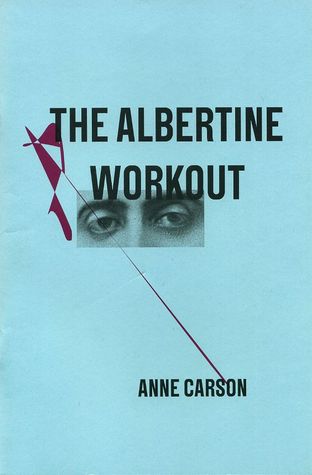Excerpt:The Albertine Workout
Once I left Gilberte early and in the middle of the night, while still half-asleep, I called Albertine. I had not been thinking or dreaming of her, nor had I mistaken her for Gilberte; a reminiscence germinating in my arm had made me seek the bell behind my back, as I used to in my room in Paris and I had called Albertine, imagining my dead friend lying beside me as she so often did at evening when we fell asleep together, counting the time it would take Françoise to reach us, so that Albertine might without imprudence pull the bell I could not find.
—Le Temps retrouvé
http://www.goodreads.com/book/show/18554592-the-albertine-workout

Recently, I find a book about Proust and it costs me almost NT$400.
This is not a common book we ever recognized. It is a workout about Albertine, who is the second lover of the narrator of In Search of Lost Time (À la recherche du temps perdu).
This book is very slight and concise, just like an exercise book, and it possibly made you doubt its value. But from the very 59 paragraphs that the auther Anne Carson summarized, we could review some scene or plot that Albertine acted in the novel, and we could learn more about the meaning or metaphor of this role.
Here I selected some paragraphs to share with someone who is interested in Proust. Let’s take a quiz now.
http://www.lrb.co.uk/v36/n11/anne-carson/the-albertine-workout
1.
Albertine, the name, is not a common name for a girl in France, although Albert is widespread for a boy.
2.
Albertine’s name occurs 2363 times in Proust’s novel, more than any other character.
3.
Albertine herself is present or mentioned on 807 pages of Proust’s novel.
4.
On a good 19 per cent of these pages she is asleep.
5.
Albertine is believed by some critics, including André Gide, to be a disguised version of Proust’s chauffeur, Alfred Agostinelli. This is called the transposition theory.
6.
Albertine constitutes a romantic, psychosexual and moral obsession for the narrator of the novel mainly throughout Volume Five of Proust’s seven-volume (in the Pléiade edition) work.
7.
Volume Five is called La Prisonnière in French and The Captive in English. It was declared by Roger Shattuck, a world expert on Proust, in his award-winning 1974 study, to be the one volume of the novel that a time-pressed reader may safely and entirely skip.
10.
Albertine does not call the narrator by his name anywhere in the novel. Nor does anyone else. The narrator hints that his first name might be the same first name as that of the author of the novel, i.e. Marcel. Let’s go with that.
17.
Once Albertine has been imprisoned by Marcel in his house, his feelings change. It was her freedom that first attracted him, the way the wind billowed in her garments. This attraction is now replaced by a feeling of ennui (boredom). She becomes, as he says, a ‘heavy slave’.
28.
Marcel appears to think he is the master of such moments.
33.
Albertine’s behaviour in Marcel’s household is that of a domestic animal which enters any door it finds open or comes to lie beside its master on his bed, making a place for itself. Marcel has to train Albertine not to come into his room until he rings for her.
38.
This pictorial multiplicity of Albertine evolves gradually into a plastic and moral multiplicity. Albertine is not a solid object. She is unknowable. When he brings his face close to hers to kiss she is ten different Albertines in succession.
52.
‘One only loves that which one does not entirely possess,’ says Marcel.
55.
Proust was still correcting a typescript of La Prisonnière on his deathbed, November 1922. He was fine-tuning the character of Albertine and working into her speech certain phrases from Alfred Agostinelli’s final letter.
57.
Granted the transposition theory is a graceless, intrusive and saddening hermeneutic mechanism; in the case of Proust it is also irresistible. Here is one final spark to be struck from rubbing Alfred against Albertine, as it were. Let’s consider the stanza of poetry that Proust had inscribed on the fuselage of Alfred’s plane – the same verse that Marcel promises to engrave on the prow of Albertine’s yacht, from her favourite poem, he says. It is four verses of Mallarmé about a swan that finds itself frozen into the ice of a lake in winter. Swans are of course migratory birds. This one for some reason failed to fly off with its fellow swans when the time came. What a weird and lonely shadow to cast on these two love affairs, the fictional and the real; what a desperate analogy to offer of the lover’s final wintry paranoia of possession. As Hamlet says to Ophelia, accurately but ruthlessly, ‘you should not have believed me.’
58.
Un cygne d’autrefois se souvient que c’est lui
Magnifique mais qui sans espoir se délivre
Pour n’avoir pas chanté la région où vivre
Quand du stérile hiver a resplendi l’ennui
(Mallarmé, ‘Le vierge, le vivace et le bel aujourd’hui’)
a swan of olden times remembers
that it is he:
the one
magnificent but
without hope setting himself free
for he failed to sing
of a region for living
when barren winter
burned all around him with ennui
59.
‘Everything, indeed, is at least double.’
—La Prisonnière p.362


 字體:小 中 大
字體:小 中 大

 字體:小 中 大
字體:小 中 大